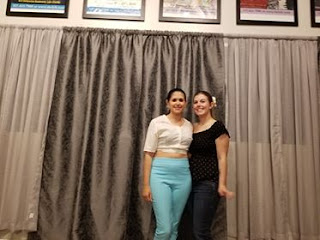Later on, the stage is split so about a third of it is a radio station and the other two-thirds is the orphanage where the girls are listening to the radio. They are amazed because that second orphan is now on the radio.
These are two scenes that can be seen in Lake Charles's Christian Youth Theater's production of Annie Jr. The play is currently being produced in the auditorium at LaGrange Senior High School.
An actress to watch is Allison Snider. Her talent and obvious hard work show in her portrayal of the bitter orphan hating Miss Hannigan. Also great is Randilyn LeJeune as Annie. If close enough to the stage, it can be seen that her facial expressions are perfect when it comes to the character of Annie.
The rest of the cast is also very talented and there is nothing weak about any of the cast in this play. They include McKenzie Menard (Molly), Gianna Lewis (Tessie), Elizabeth Campbell (July), Hannah Miller (Duffy), Ava DeLano (Kate), Elisabeth Pettefer (Grace Farrell), Quaid Nichols (Rooster), Olivia DeLano (Lily), Abram Conner (Warbucks), Zachary Benot (Drake), Chase Landry (Mrs. Greer), Hunter Becton (Mrs. Pugh), Claire Bailey (Cecile), Brynn Mayo (Annette), Cooper Self (Bundles), Maria Lee (Chauffer), Benjamine Gabre (Louis Howe), Rachael Riquelmy (Dogcatcher), Duff Nichols (FDR), Dylan Freeman (Bert Healy/Announcer), Annalise Funk (Sounds Effects Woman), Alana Fournet (Star to Be), Kyah Busby (Police Officer Ward/Cop/Policewoman), Olive Foreman (Man/Maid Servant #1), Abigail Pettefer (Man/Maid Servant #2), Harleigh Miller (Man/Maid Servant #3), Bliss Nichols (Man/Maid Servant #4), Kellsie Jones (Man [Woman]), and Aubree Babaz (Usherette).
The Orphan Ensemble is made up of Kaylee Mayo, Nyla Sonnier, Rylee Menard, and Zoe Thrasher. The Servant/NYC Ensemble is made up of Amanda Sanders, Blaire Buller, Elliot Fuselier, Grace Boyer, Kamila Vigo, Katherine Pierrotti, Kathryne Berken, Morgan Castillo, and Niobe Jade.
The lighting is wonderful. White lights highlight happy scenes while red illuminate and give the feel or hate or anger. Blue lights are often used for sadness or night time.
I lost my program somewhere along the way from leaving the theatre to my car, so I am sorry for not mentioning everybody. The director, ?, and the assistant director, Brahnsen Lopez, did a wonderful job of making it so the actors are always visible, yet, when they need to be in groups, they are placed into groups, yet not bunched into a crowd. The choreography by Joey Boyette is extremely impressive as the actors follow it at all different ages and yet, it is stunning and fun to watch on stage.
Annie Jr. can be seen three more times. They are:
- Saturday, May 11 at 2pm
- Saturday, May 11 at 7pm
- Sunday May 12 at 3pm
Standard Tickets are $15. Tickest for children aged 12 and under, people 65 years of age and older, members of the military, students, and for each person if in a group of 10 or more are $10. If tickets are purchased at the door, they are $20.
Get the $15 online via credit card at Lake Charles's Christian Youth Theater's Webite by clicking the blue button that says "Purchase Tickets."



















